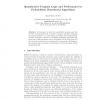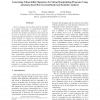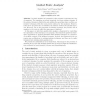613 search results - page 29 / 123 » An analysis framework for network-code programs |
160
click to vote
ISSTA
2012
ACM
13 years 4 months ago
2012
ACM
A static analysis design is sufficient if it can prove the property of interest with an acceptable number of false alarms. Ultimately, the only way to confirm that an analysis d...
117
Voted
SNPD
2008
15 years 3 months ago
2008
In the social reality, objects communicate with each other by means of assuming roles to establish collaboration, and then can adaptively change their roles to obtain other intera...
131
click to vote
ARTS
1999
Springer
15 years 6 months ago
1999
Springer
In this paper we show how quantitative program logic [14] provides a formal framework in which to promote standard techniques of program analysis to a context where probability and...
KBSE
2009
IEEE
15 years 9 months ago
2009
IEEE
Given a program and an attack pattern (specified as a regular expression), we automatically generate string-based vulnerability signatures, i.e., a characterization that includes...
103
Voted
SAS
2007
Springer
15 years 8 months ago
2007
Springer
In static analysis, the semantics of the program is expressed as a set ions. The equations are solved iteratively over some abstract domain. If ract domain is distributive and sati...



